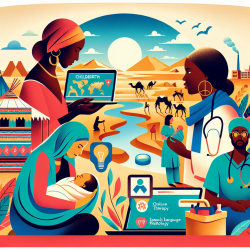Understanding Sociocultural Determinants in Childbirth: Lessons from Gossi, Mali
In the realm of healthcare, understanding the unique challenges faced by diverse populations is crucial. A recent qualitative study titled "Sociocultural determinants of nomadic women’s utilization of assisted childbirth in Gossi, Mali" offers profound insights into the barriers and facilitators affecting nomadic women's access to assisted childbirth. As practitioners focused on improving outcomes for children and families, it is essential to consider these findings and their implications for service delivery.
The Study: A Closer Look
The research conducted in Gossi, Mali, aimed to uncover the sociocultural determinants influencing the use of assisted childbirth among nomadic women. The study utilized a qualitative approach, including semi-structured interviews, non-participant observations, and a thematic content analysis using QDA Miner software. The findings revealed a complex interplay of factors that either promote or hinder the use of healthcare services during childbirth.
Key Findings and Implications
- Body Representations and Experiences: Many women view pregnancy as a natural process, often hiding their condition due to cultural taboos surrounding sexuality. This perception can delay the decision to seek healthcare.
- Risks and Emotions: The fear of complications and pain during childbirth is prevalent. While some women recognize the benefits of assisted childbirth, cultural norms often dictate home births unless complications arise.
- Autonomy and Decision-Making: Women's autonomy is limited by cultural and economic factors. Decisions regarding childbirth often involve a network of male family members, highlighting the need for community-based interventions to empower women.
Applying These Insights
For practitioners, these findings underscore the importance of culturally sensitive approaches to healthcare delivery. Strategies to improve outcomes for nomadic women in Mali, and similar contexts, may include:
- Developing community education programs to shift perceptions about assisted childbirth and its benefits.
- Empowering women through education and economic opportunities to enhance their decision-making autonomy.
- Engaging male family members and community leaders in discussions about the importance of maternal healthcare.
Encouraging Further Research
While this study provides valuable insights, further research is needed to explore the broader implications of these sociocultural determinants across different regions and populations. By expanding our understanding, we can develop more effective interventions to support maternal and child health.
To read the original research paper, please follow this link: Sociocultural determinants of nomadic women’s utilization of assisted childbirth in Gossi, Mali: a qualitative study.










